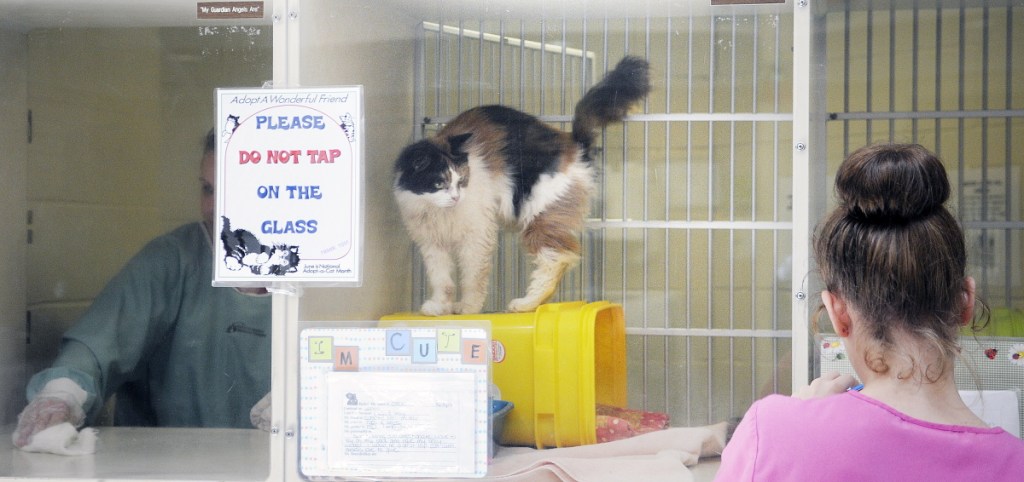AUGUSTA — Finding a local nonprofit group willing to take his volunteer help proved daunting for Darel A. Smith II, 30, of Augusta.
In February 2017 at the Capital Judicial Center, Smith accepted a deferred disposition deal that involved his pleading guilty to operating after suspension and agreeing to fulfill a number of requirements over the next 12 months. If he was successful, the charge would be dismissed. He decided this arrangement was best.
In February, Smith was back at the courthouse with everything in order, and the state dismissed the charge.
But he told two assistant district attorneys separately about his struggle trying to find an agency that would allow him to do his 40 hours of public service.
“I was astonished,” Smith said. “I really was. The hoops you have to go through, you find it very difficult.”
He had started looking almost immediately last winter, calling the Kennebec Valley Humane Society, Lithgow Public Library, the Kennebec Valley YMCA, the Baptist and Pentecostal churches, the Maine Veterans’ Home, and the Augusta Food Bank, among several other obvious candidates.
“All of these places you had to fill out an application, for one thing, and (for some) you had to pass a criminal background check and grant them permission to open any (Department of Health & Human Services) and child protective cases that were against you in order to volunteer,” Smith said.
He had some success with a group that shovels snow for people in Augusta, but added that if you didn’t have an “in” already, it was tough to arrange to volunteer with any group.
In the end, he went back to his roots, contacting friends who operate Cottontail Cottage Rabbit Rescue in Lamoine, some two hours away in the Down East area. “It’s a rabbit habitat for rescue rabbits,” said Smith, who is originally from Ellsworth.
He built enclosures for the animals and insulated those structures to make sure the animals could use them in winter.
“It was fun,” he said last week. “I never really had any experience working with rabbits in particular. I learned a lot; that is kind of the big thing out of it.”
Deferred dispositions, available under Maine law since about 2003, require a defendant to plead guilty and meet court-ordered requirements over a fixed time period. The penalty for the guilty plea is postponed, and among those requirements is one that “the person refrain from criminal conduct.”
The law also states that conditions of the deferment can be modified by the court “if a person cannot meet a deferment requirement.”
MAKING IT WORK
As Smith waited in the courtroom to see his charge dismissed, another man talked to the same prosecutors about how difficult it was to do community service.
That person had paperwork saying he put in 80 to 90 hours of volunteer work at the home of a friend’s grandmother. The defendant said the woman was disabled. He had her phone number in case prosecutors wanted to call her.
Assistant District Attorney Alisa Ross first asked if he was paid for the work, and he told her he wasn’t. Then she told him that while it was unusual and that volunteering with organizations was preferred, she would accept it, and his charge was dismissed as well. Smith said he was pleased to see that.
Another defendant told a judge a month or so earlier that she was unable to find volunteer work because she had no driver’s license. She was willing to accept her conviction for a misdemeanor offense.
After asking her a series of questions, the judge told her to try again and seek hours at the Litchfield Food Bank, which was housed in a church near her home.
Those defendants were not alone. Doing community service to avoid a criminal conviction for a relatively minor offense is not as easy as it sounds, especially if defendants decide to resolve their cases themselves.
“In the majority of cases where an individual is required to complete community service, people have difficulty finding agencies that are going to allow them to do that,” said attorney Scott Hess, who represents a number of defendants in Kennebec County. “I tell my clients to document their attempts the best they can, and I try to provide them with a number of organizations that will work with people to complete their community service.”
LIMITED OPTIONS
In response to a reporter’s inquiries about that difficulty, the Kennebec County District Attorney’s Office placed 100 phone calls to agencies last week and now has a list of 15 groups in Augusta, Chelsea, Searsport and Waterville that will take those volunteers. “The question enabled us to produce a far better piece of information,” said Maeghan Maloney, district attorney in Kennebec and Somerset counties.
That list will continue to be updated as more information comes in. Previously, defendants received a photocopied brochure from Augusta District Court that listed 11 nonprofit organizations willing to take people who needed to do public service, but that list had not been revised for almost a decade.
The Kennebec County District Attorney’s Office has about 500 people a year on deferred dispositions, which are generally for 12 months but can be for as short as six months or as long as two years. Of the 160 people whose deferred disposition cases were resolved in 2017, about 80 percent were successful, according to a report prepared by the office. In Somerset County, which is also in Maloney’s district, 194 people were on deferred disposition in 2017. Of the 27 cases resolved that year, 16 of them were reported as successful.
Across the state, 4,211 deferred dispositions were ordered in cases, according to figures compiled by the Maine Judicial Branch.
The deferrals are mostly for traffic crimes and other misdemeanor offenses such as theft. Maloney said people charged with more serious offenses and those who have been convicted of sex crimes, for instance, are not offered deferred dispositions. Deferred dispositions also are used in cases involving defendants ages 18 to 20. In most of those cases in Kennebec County, for instance, the defendants complete the 12-hour PRIME for Life Risk Reduction Class “for people who have made unhealthy choices about substance abuse: alcohol and other drugs.” That program does not include a community service component.
The predominant type of instance in which community service is ordered is a pending charge of operating under the influence, theft or operating after suspension, Maloney said.
In the case of a drunken-driving charge in Kennebec County, the defendant usually pleads guilty to a charge of driving to endanger at the end of the deferred disposition period rather than having the charge dismissed.
‘WE TRY TO ACCOMMODATE THEM’
People on deferred disposition also pay a monthly supervision fee, $10 to $25, to the district attorney’s office. The Kennebec County office took in $77,790 in deferred disposition fees in 2017; Maloney said defendants in Somerset County paid $17,569 in supervision fees in 2017.
Maloney said that in some special circumstances, she will waive a supervision fee, particularly if defendants are paying restitution, and the office will extend the time period if people need to complete public service.
“We want people to be successful. Even when they don’t get it in on time or need more time to pay, it’s acceptable,” she said. “We try to accommodate them.”
Maloney has accepted defendants’ volunteer work with individuals as well.
“I have heard defendants say, ‘Is it OK that I helped out my mother and grandmother?’ ” She says yes.
‘A VERY SUCCESSFUL THING’
Deferred dispositions are used across the state.
“I do think it’s a very successful thing or a mechanism that we use to try to get someone to contribute back to the community and still be able to avoid the consequences of a conviction,” said Andrew Robinson, district attorney for Androscoggin, Franklin and Oxford counties.
Jonathan Liberman, district attorney for Knox, Lincoln, Sagadahoc and Waldo counties, said defendants have told him they have problems finding agencies willing to accept them as volunteers.
“Most of the time, they find a place to do the work.” He added, “If they’re on a deferred, they (are) pretty motivated to get that done.”
He added, “A good thing about the deferred is acceptance of responsibility upfront with a guilty plea.”
Defense attorney Lisa Whittier echoed Liberman’s sentiments, saying a motivated defendant will find a place to volunteer.
Queries about which agencies accept as volunteers people placed on deferred disposition produced mixed results.
When Elizabeth Pohl, director of Lithgow Public Library in Augusta, received a call from a clerk in the Kennebec County District Attorney’s Office last week, she asked for the library to be removed from the list of those accepting volunteers.
“I had told people years ago we weren’t going to do that anymore. A couple of times we were taken advantage of,” Pohl said, adding that one incident involved a theft. “The volunteers we do have have to undergo criminal background checks, as does anyone hired here.”
She said the library uses a few skilled volunteers who have had experience working in libraries in Augusta or elsewhere.
“The thing with volunteers is it takes time to train them, to support them and to make sure they’re feeling appreciated,” she said. The Kennebec Valley Humane Society in Augusta welcomes volunteers who need to do public service; however, there are some restrictions.
“We do appreciate the concept here of making mistakes and paying dues back and serving your community,” said Hillary Roberts, executive director. “But we take safety seriously. If they’re not soft crimes, we do not accept them.”
The general volunteer application says: “If you were referred to KVHS for court-ordered Community Service or to receive leniency from the courts, a Community Service application will need to be obtained by the Volunteer Coordinator.”
The organization does not accept volunteers convicted of felonies or crimes committed with a weapon or violence or animal cruelty/neglect, among other offenses.
“For any of our volunteers, we do volunteer screening whether they’re court-ordered or doing it from the goodness of their hears,” Roberts said. “We do criminal background checks and Social Security verification.”
Criminal background checks for volunteers are required by many groups.
“A criminal background check is standard practice for volunteers who are working with vulnerable populations,” said Maryalice Crofton, executive director of the Maine Commission for Community Service. “If you’re working for a land trust and planting trees, for instance, they’d be doing background checks.”
She also spoke of the practice of “neighboring,” describing that as an opportunity where “you can just show up, pitch in and help out,” such as shoveling snow for someone temporarily unable to do it.
“It’s not an ongoing need in the community that’s being met through an organized effort that goes multiple years.”
In contrast, she said, “formal volunteering needs to be set up so people can move in and out of the system – even the managers in the system – and it doesn’t break down.” She cited snowbirds as an example.
“You have to stand back and look at things from a risk management perspective,” Crofton said. “What does due diligence look at for me in my program? You have to look at what could go wrong and what do I need to know before I let somebody go in. Some places will be fine because (the volunteers) are never going to leave the eyeballs of the employees. It’s all risk management and common sense.”
Betty Adams can be contacted at 621-5631 or at:
badams@centralmaine.com
Send questions/comments to the editors.




